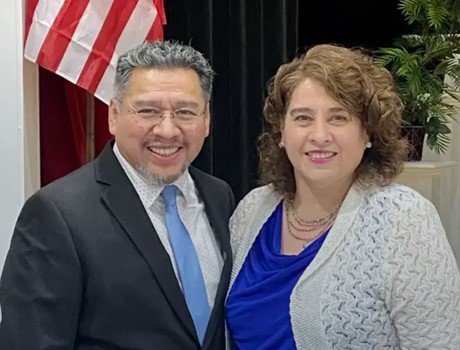About The Missionary
SAVED BY GRACE
Rubén was born into a strong Catholic family in Bolivia. While a university student in mechanical engineering, he heard the gospel for the first time and accepted Christ. Due to his newfound faith, he left his old beliefs behind and developed a hunger to learn the Word of God. He attended and completed the requirements at WOL Bible Institute in Argentina. He then attended and graduated with a BA from the Theological Baptist Seminary in Bolivia. Ruben continued post-graduate work for a Masters and received his Ph.D. from Louisiana Baptist University. While a student at the Bible institute in Argentina, he became involved in church planting in Buenos Aires and ministered to other ethnic groups along the Brazilian/Bolivian border. He then became involved in church planting in Bolivia. During this time, he was ordained and served as a church-planting missionary in Cochabamba, Bolivia. Several Baptist churches were established, and Rubén also began the Logos Theological Seminary. In 2011, a new dynamic ministry was introduced by IPM: ethnic church planting in the United States. The ethnic landscape has changed dramatically in the US in the past decade. In January 2012, IPM-USA was launched. At that time, Rubén made known his desire to make a major ministry change which involved relocating from Bolivia to the U.S. After much prayer and consideration, his request was approved by IPM, and Ruben has been serving the Spanish-speaking people of the United States ever since.
Latest Prayer Letter
Project Giving Opportunities
Sorry, there are no projects at this time.
Updates From The Field
Sorry, there are no updates at this time.
About The Field:
Tennessee, a southeastern state in the United States, encounters a blend of economic and social challenges shaped by its historical legacy, diverse geography, and cultural dynamics.
Economically, Tennessee exhibits a mix of industries, including manufacturing, agriculture, and services. While major cities like Nashville and Memphis contribute to economic vibrancy, rural areas face challenges such as limited job opportunities and access to resources. The state has experienced fluctuations in unemployment rates, influenced by factors like global market conditions and technological changes affecting certain industries.
Social challenges in Tennessee are diverse. Access to quality education varies, with urban centers generally having better educational resources than some rural areas. Healthcare accessibility is a concern, particularly in communities with limited access to medical facilities.
Historically, Tennessee played a significant role in the American Civil Rights Movement, with Nashville being a key center for activism. While progress has been made, racial and economic disparities persist, impacting social dynamics and community relations.
Religion holds a prominent place in Tennessee, with a predominantly Christian population. Protestant denominations, including Baptists and Methodists, are prevalent. Historical and cultural influences have shaped the conservative religious landscape, impacting social values and political perspectives.
The state grapples with challenges related to opioid addiction and substance abuse, contributing to health and social issues. Tennessee also faces concerns related to poverty, with pockets of the population experiencing economic hardships.
Tennessee’s unique geographical features, including the Appalachian region, present challenges related to infrastructure development and connectivity. Rural areas may face difficulties accessing essential services and economic opportunities.
